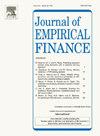Bear factor and hedge fund performance
IF 2.4
2区 经济学
Q2 BUSINESS, FINANCE
引用次数: 0
Abstract
We find that hedge funds that have low (negative) return covariance with the return of a bear spread portfolio (i.e., Bear factor) after controlling for the market factor, earn significantly higher returns in the cross-section. The return spread does not reflect bear risk premia; instead, it represents a low risk-high return relation. We decompose the Bear factor into different components to identify the one driving the bear beta effect on fund performance and show that the return spread can be attributed to the differential ability of low bear beta funds to reduce their market exposures when the market declines and the VIX increases (i.e., downside timing). Further analysis suggests that these fund managers are more skilled at selling overpriced insurance during volatile market periods. Overall, we propose a simple option-implied predictor of hedge fund returns and unravel a novel economic mechanism that associates the Bear factor exposure with fund performance.
熊市因素与对冲基金业绩
我们发现,在控制了市场因素后,对冲基金与熊市价差投资组合(即熊市因素)的收益协方差较低(负)的对冲基金在横截面上的收益显著较高。收益差不能反映风险溢价;相反,它代表了一种低风险-高回报关系。我们将熊市因素分解为不同的组成部分,以确定驱动熊市贝塔效应对基金业绩的因素,并表明收益差可归因于低熊市贝塔基金在市场下跌和VIX上升时(即下行时机)减少市场敞口的不同能力。进一步的分析表明,这些基金经理更善于在市场波动时期出售定价过高的保险。总体而言,我们提出了一个简单的期权隐含预测对冲基金收益的方法,并揭示了一个新的经济机制,将贝尔斯登因素暴露与基金业绩联系起来。
本文章由计算机程序翻译,如有差异,请以英文原文为准。
求助全文
约1分钟内获得全文
求助全文
来源期刊

Journal of Empirical Finance
Multiple-
CiteScore
3.40
自引率
3.80%
发文量
59
期刊介绍:
The Journal of Empirical Finance is a financial economics journal whose aim is to publish high quality articles in empirical finance. Empirical finance is interpreted broadly to include any type of empirical work in financial economics, financial econometrics, and also theoretical work with clear empirical implications, even when there is no empirical analysis. The Journal welcomes articles in all fields of finance, such as asset pricing, corporate finance, financial econometrics, banking, international finance, microstructure, behavioural finance, etc. The Editorial Team is willing to take risks on innovative research, controversial papers, and unusual approaches. We are also particularly interested in work produced by young scholars. The composition of the editorial board reflects such goals.
 求助内容:
求助内容: 应助结果提醒方式:
应助结果提醒方式:


